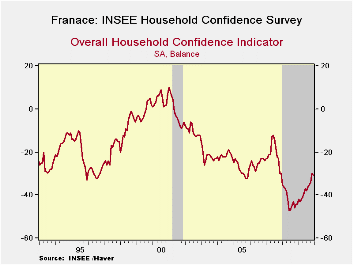 Global| Jan 05 2010
Global| Jan 05 2010French Consumers Take A Step Back After Fourth Months of Improved Confidence
Summary
From its low point in mid 2008 France’s Consumer confidence is still making a long slow recovery. Its drop of one point in December does not signal an end to the climb which, although substantial, has only brought the index to the [...]

From its low point in mid 2008 France’s Consumer confidence is still making a long slow recovery. Its drop of one point in December does not signal an end to the climb which, although substantial, has only brought the index to the 28th percentile of the range of values it has occupied Since January 1990. By rank the index is in the 15th percentile meaning that 85% of the 240 observations over this period lie above it.
Despite some significant improvement in consumer confidence the indicator remains at a very low point historically. This underlines how severely impacted confidence was as its lows. Since April of 1991 this has been the third strongest string of increases in the index over any sixteen month period, yet the overall measure of confidence remains mired in a low range- reading.
The prospect of unemployment is in the 75th percentile of its range or the 81st by rank implying that French workers infrequently have felt as threatened by unemployment as they are now.
However French respondents mark their current financial situation as improved and as much better than it was over the last 12-months putting it in the top third of its range and the top 11 percent by rank.
French workers put living standards in the bottom 14 percentile of their range over the last 12-months but boost that standing to the 29th percentile (still pretty low) over the next 12 months, in their outlook
On balance the story of the French consumer is still unfolding underpinned by positive trends. The main problem is that conditions had deteriorated so badly and there is a long way to go to get back to normal. This month brought a one-point set back but that hardly seems indicative of a new, more adverse, trend. Progress still appears to be made.
| INSEE Household Monthly Survey | ||||||||||
|---|---|---|---|---|---|---|---|---|---|---|
| Since Jan 1990 | Since Jan 1990 | |||||||||
| Dec 09 |
Nov 09 |
Oct 09 |
Sep 09 |
Percentile | Rank % | Max | Min | Range | Mean | |
| Household Confidence | -31 | -30 | -34 | -35 | 28.1 | 15.0 | 10 | -47 | 57 | -19 |
| Living Standards | ||||||||||
| past 12 Mos | -66 | -66 | -70 | -72 | 14.3 | 13.3 | 18 | -80 | 98 | -40 |
| Next 12-Mos | -37 | -36 | -40 | -41 | 29.3 | 18.8 | 16 | -59 | 75 | -21 |
| Unemployment: Next 12 | 61 | 62 | 65 | 76 | 75.4 | 81.7 | 93 | -37 | 130 | 32 |
| Price Developments | ||||||||||
| Past 12Mo | -26 | -27 | -28 | -34 | 25.6 | 47.9 | 64 | -57 | 121 | -16 |
| Next 12-Mos | -43 | -46 | -46 | -50 | 18.3 | 31.3 | 33 | -60 | 93 | -35 |
| Savings | ||||||||||
| Favorable to save | 11 | 14 | 7 | 4 | 37.8 | 15.8 | 39 | -6 | 45 | 22 |
| Ability to save Next 12 | -6 | -8 | -11 | -14 | 58.6 | 72.5 | 6 | -23 | 29 | -9 |
| Spending | ||||||||||
| Favorable for major purchase | -20 | -19 | -24 | -27 | 37.9 | 37.1 | 16 | -42 | 58 | -14 |
| Financial Situation | ||||||||||
| Current | 17 | 18 | 13 | 13 | 66.7 | 89.6 | 24 | 3 | 21 | 12 |
| Past 12 MOs | -20 | -22 | -24 | -25 | 53.1 | 31.3 | -5 | -37 | 32 | -17 |
| Next 12-Mos | -10 | -8 | -12 | -11 | 40.0 | 15.0 | 11 | -24 | 35 | -2 |
| Number of observations in the period 240 | ||||||||||
Robert Brusca
AuthorMore in Author Profile »Robert A. Brusca is Chief Economist of Fact and Opinion Economics, a consulting firm he founded in Manhattan. He has been an economist on Wall Street for over 25 years. He has visited central banking and large institutional clients in over 30 countries in his career as an economist. Mr. Brusca was a Divisional Research Chief at the Federal Reserve Bank of NY (Chief of the International Financial markets Division), a Fed Watcher at Irving Trust and Chief Economist at Nikko Securities International. He is widely quoted and appears in various media. Mr. Brusca holds an MA and Ph.D. in economics from Michigan State University and a BA in Economics from the University of Michigan. His research pursues his strong interests in non aligned policy economics as well as international economics. FAO Economics’ research targets investors to assist them in making better investment decisions in stocks, bonds and in a variety of international assets. The company does not manage money and has no conflicts in giving economic advice.
More Economy in Brief
 Global| Feb 05 2026
Global| Feb 05 2026Charts of the Week: Balanced Policy, Resilient Data and AI Narratives
by:Andrew Cates






